Alberto Pallone (1897-1977) was a communist militant from Sgurgola (see my webpage) in the province of Frosinone, who emigrated to the United States, fought in the Spanish Civil War with the International Brigades that supported the Republic, and was persecuted by the Italian fascist regime, which sent him into confinement on Ventotene island. In all his life events Alberto was accompanied by his musical instrument, the baritone horn (in Italian: “bombardino”), which became an essential part of his image.
The
family of origin
Alberto was born on June 20th, 1897 in Sgurgola,
at the time and until 1927 in the province of Rome, from which
it is about 70 km away. He was born in his parents' home in via
del Calvario, to Lorenza Posta, a 30-year-old housewife, and
Camillo
Pallone,
a 39-year-old blacksmith.
Lorenza, born in 1867, was daughter of the notary Raffaele and
Maria Perfetti, she had lost her father at the age of six and
her mother at the age of eight, and had grown up under the tutelage
of her uncle Don Domenico Posta, of the noble family of Sgurgola,
the counts Posta della Posta.
Camillo, was born in 1858, from a family originally from Morolo,
a town near Sgurgola. He was a socialist, wore a Lavallière
tie, characteristic of left-wing people, and even in old age he
was watched by the police. In 1928, when he was 70 years old,
the Prefecture of Frosinone defined him as having “bad
moral conduct, with socialist-communist principles, … to
be considered against the regime”.

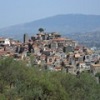
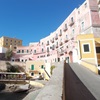
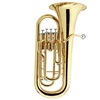
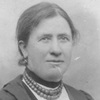

Camillo's
father, Francesco, had died in prison because, when he was already
old, he had punched a policeman. Camillo was a blacksmith, like
his father and his brother Antonio; he also had a sister, Candida,
married in another town in that area, the Ciociaria. Alberto's
parents lived in via Calvario until their deaths, Camillo died
in 1941, and until the age of eighty he worked in his blacksmith
shop, in front of his house (now number 19 of the street). Lorenza
died in 1954.
Lorenza and Camillo had seven children: Maria (1888), Ennio (1889), Medoro (1892), Guido (1893), Quirino
(1894), Alberto (1897) and Gustavo (1899). All the
male brothers trained in their father's blacksmith shop, where
they learned the first rudiments of the trade, but of them only
Guido became a blacksmith like his father. All the male brothers
had studied music and played in the village band.
According to the Prefecture of Frosinone, theirs was a “family
of fierce opponents who, during the post-war period, organized
local communism in Sgurgola and caused numerous incidents with
the fascists”. In fact, the brothers were all communists,
except Ennio who was an anarchist. In another document, the Prefecture
even explains that the family was held “in very poor esteem
by the healthy part of the population of Sgurgola”. Medoro
was a local anti-fascist leader throughout the dictatorship and
in the post-war period (see my my webpage on him).
Alberto, like his brothers,
attended primary school and later the Prefecture of Frosinone
described him as follows: “He belongs to an amoral and
fanatical family. His mother Posta Lorenza, daughter of Raffaele
(…) is a lunatic (…). Pallone Alberto attended primary
school, simultaneously helping his brothers and his father. In
that period he revealed himself to be ruthless and wicked together
with his brothers and under the constant instigation of his father,
towards the poor old and imbeciles of the village”.

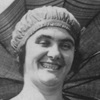
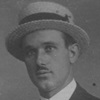
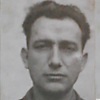
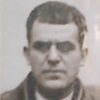
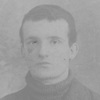
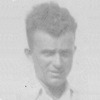
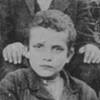

World
War I
All six Pallone brothers fought in the First World War, except
Gustavo, who according to a file from the Prefecture of Frosinone
was discharged, and all returned home safe and sound. Alberto
was enlisted on July 4th, 1916, and fought
in the 341st Engineer Battalion,
then he was a bugler in the band of the 2nd Grenadier Battalion. Alberto
narrated that he was sent to Asiago together with Gustavo (who,
however, as seen, results discharged), but when his younger brother
was sent to the front line, Alberto offered to go in his place.
A soldier, Carbonari, witnessed the event and complimented him,
calling his gesture revolutionary, and so he began to tell him
about the conquests of the Soviet revolution in favor of the workers.
Later, his comrade in arms Landi, from Empoli, also told him about
the conquests of the Bolshevik revolution.
Alberto said that, before leaving for the war, he was a fervent
Catholic, and even defined himself as a "diehard Catholic",
"bigot" and "churchgoer", but
when he returned to Sgurgola after his discharge, as the Prefecture
of Frosinone recounts, he proved to be "one of the most
ruthless (sic) organizers of local subversion, even causing
incidents with the fascists".
After
the war
Alberto joined the Italian Socialist Party (Partito
Socialista Italiano, PSI) in 1920 and the Communist Party of
Italy (Partito
Comunista d'Italia
or Pcd'I) in January 1921, founded on 21st of the same month of January,
(see my webpage), also due to the proselytism
of the communist lawyer from Terni Angelo Baldassarri (1881-1963),
the promoter of the “land invasions” to hand over uncultivated
lands to farmers. For his ideas Alberto was fired from his job
in the urban cleaning department.
The difficult conditions after the First World War and the example
of the Soviet Revolution of 1917 created a political movement
of revolt, led by communists, socialists and anarchists, which
carried out occupations of factories and lands, in particular
those of large landowners, including the Catholic Church.
The English historian Eric J. Hobsbawm wrote about the land occupation
movement in 1919: «Thus the movement in Latium, which
set off a nationwide wave of land invasion in 1919, claimed to
"defend the land to which they asserted legal rights
against the usurpers"».
The Vatican newspaper, L'Osservatore Romano, quoted by Del Carria,
wrote: «At dawn, ... improvised caravans of peasants,
to the sound of music and with banners, marched upon the latifundia
of the region and decreed their occupation, indicating the boundaries
of the areas they occupied with special marks".
In 1920 elections the socialists conquered 30 municipal administrations
in the province of Frosinone, including Sgurgola, and in 1923
the local unit of the PSI of Sgurgola passed en bloc to the Communist
Party of Italy, which in April 6th, 1924 reached 20%.
The transformation of Italy from a democratic country into a fascist
dictatorship, with the consequent aggression and persecution of
opponents, pushed Alberto to abandon his country.
To
America
In April 1925, Alberto decided to emigrate to the USA, but the
immigration quotas were exhausted, so he decided to go through
Canada. He went to Paris to ask for a visa, because there was
no Canadian embassy in Italy, so he moved to Canada, then in June
he crossed the border by crossing Lake Ontario with a small boat
paid for 50 dollars, and entered the USA as an illegal immigrant.
First he joined his brother Gustavo in Detroit, who had already
been living in the USA since 1923, and who was not expecting his
arrival. In Detroit he worked at Ford and then did various jobs,
then he moved to Cleveland, and after a year the two moved to
New York, where Gustavo remained all his life, living in the Bronx
until his death on April 1st, 1983. Alberto managed to escape the FBI
inspections, looking for illegal immigrants, using the false name
of Del Favero. Perhaps it was not by chance that he chose a false
surname, which in Venetian means “blacksmith's”, like
his father’s profession, which he himself had learned as
a young man.
He joined the Communist Party of the United States of America (CPUSA) and met
its General Secretary William Z. Foster, and became a member of the party’s
musical band. He worked in the IWW (Industrial Workers of the World organization) trade union
whose militants were called "Wobblies", the same
as Joe
Hill
(see my webpage on him), but in 1933 he was arrested and sentenced
to a year in prison. In 1934 he was released but kept under surveillance
for two years, and in 1935 he had to go underground, using the
false surname of Strada.
Alberto was also under surveillance by the Italian consulate in
New York, because he was reported as an anti-fascist. According
to the report of the Prefecture of Frosinone, he continued "to
keep in epistolary contact with the subversive elements of Sgurgola,
sending letters and propaganda material published by the communist
concentrations established in the USA".
Consequently, the correspondence between Alberto and Gustavo and
the brothers who remained in Italy, including Medoro, was opened
and read and the Pallones, knowing this, used coded language,
avoiding naming the people directly, but defining them as the
son of ..., followed by the nickname in dialect of their father
or mother.
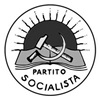
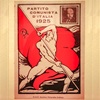
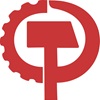
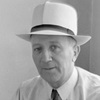


The
civil war in Spain
At the outbreak of the civil war in Spain he left New York with
the Abraham Lincoln Brigade (as reported on July 24th, 1937 by the
Italian consulate) with a passport issued by the general consulate
of the Spanish republican government in Valencia, registered to
Antonio Palas Monte. The journey started from New York, to reach
Le Havre, then by land to Paris, Perpignan, across the Pyrenees,
finally reaching Spain, in Figueras. He was then in Albacete,
took part in some "musical unrest tours", as
he recounted in his letters, and took part in the Ebro offensive,
with the Garibaldi Brigade and the International Brigades.
Discharged in February 1939, with the defeat of the Republic,
he was evacuated to France and tried to embark in Le Havre to
reach Mexico and return to the United States, but was blocked.
He was then interned for three years in the prison camps of Saint-Cyprien (Pyrénées-Orientales),
Gurs (Pyrénées-Atlantiques)
and Vernet Ariège),
where he suffered severely from cold and hunger, as he recounted
in later years.
He was then arrested by the Nazi occupation authorities, and the
collaborationist French gendarmerie of Vichy handed him over to
the Italian fascist police on June 10th, 1942 at the border station of
Menton, from where he
was transferred to the prisons of Ventimiglia, Genoa, Pisa, Rome
(Regina
Coeli)
Frosinone and Gaeta.
According to the Prefecture of Frosinone, Alberto had "been
registered in the Border Register and in the Research Bulletin,
for the provision 'to be arrested'". Alberto, interrogated
by the fascist police, said that he had not taken part in combat
but only in band initiatives, but it is possible that he made
these statements only to exonerate himself.
Confinement
on Ventotene
On August 13th, 1942, a Fascist
Special Tribunal for political crimes sentenced Alberto to five
years of confinement on the island of Ventotene, in the Pontine
archipelago. In reality, he remained imprisoned for only one year,
because on July 25th, 1943, Mussolini
was arrested, the fascist regime fell, and on August 7th, Alberto and
the other confined people were freed, so many of them left the
island on a fishing boat.
Sandro
Pertini,
who was President of the Italian Republic from 1978 to 1985, was
also imprisoned in Ventotene. Pertini recalls in his memoirs: "The
first group of inmates set out. A large fishing boat had been
sent. We saw them climb up, climb the masts, cling to the shrouds,
waving their hands and waving handkerchiefs at us. Suddenly a
confined inmate, a former fighter in Spain, who somehow had managed
to bring a baritone horn with him to Ventotene, from one concentration
camp to another, began to play with all the breath he had in his
lungs: Go out of Italy, go out that it's time ... From
the pier a solemn chorus rose up: the words of the ancient patriotic
song were chanted by all of us with passion and while we stared
at the German anti-aircraft gunners, who, with livid faces, were
lined up not far away".
It is not necessary to specify who the confined man returning
from Spain who played the baritone horn was.
Garibaldi's Hymn, played by Alberto in Ventotene, can be heard
on this link.
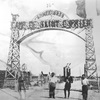
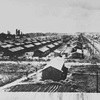
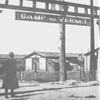
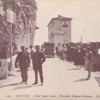

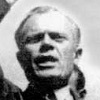
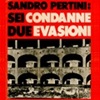
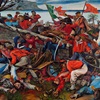
Back
to Sgurgola
About a month after the liberation from Ventotene, the armistice
of September 8th, 1943 was made
public, and nazi troops broke into central and northern Italy.
Alberto had no references to Rome, which was under heavy nazi
occupation, and in any case his brother Ennio, who worked as a
taxi driver in Rome, having been struck off the railways for political
reasons, had taken refuge in Sgurgola. Ennio's house in Rome,
in via Emanuele Filiberto, was very close to the infamous nazi
prison in via Tasso, and in addition two of his sons, just over
twenty years old, were in danger of being forcibly conscripted.
Alberto then took shelter in Sgurgola, his hometown, to which
he had not returned for eighteen years. He was hosted in his mother's
house (his father had died in 1941), while the adjacent houses
hosted his brothers Medoro, with his three daughters, and Ennio,
with his sons Spartaco and Camillo.
The nazis carried out repeated roundups to capture able-bodied
males, to dig trenches in Cassino, bursting into the main street
of the town with trucks, entering houses, and capturing anyone
they could surprise.
Alberto and his kins lived in an innermost street, and were warned
of the roundups by their relatives who had windows on the main
street, who looked out from the back side windows and warned of
the Nazis' arrival. Thus the Pallone males always managed to escape,
fleeing through the fields below the town and then climbing up
the mountain, after passing under the church of San Giovanni.
One day Alberto did not hear the alarm for the arrival of the
nazis, because he was practicing with his baritone horn in front
of the mirror, but his niece Gabriella came to call him and he
had time to get to safety.
Sgurgola was not directly involved in the fighting, but its inhabitants,
including the Pallone family, saw and heard the artillery fire
pass over their heads, witnessed the passage of Allied bombers,
saw downed fighter planes fall, and helped save their pilots.
The
Garbatella
After the war, Alberto lived in Rome and, as a former political
persecuted person, he was assigned a job as an usher at the Ministry
of Justice, headed at the time by Palmiro Togliatti, the secretary of the Italian
Communist Party (Partito Comunista Italiano). He was assigned
a flat in the Albergo Rosso (Red Hotel),
one of the four housing complexes built in the Garbatella neighborhood
in the 1920s to house displaced people from the areas of central
Rome, victims of the devastation of Mussolini's "healing
pick".
In September 1948, Alberto married Giselda Scardavelli, and lived
with her in the neighborhood; they had no children. Alberto animated
the neighborhood section of the Italian Communist Party and always
maintained a good relationship with the Soviet Union, so much
so that he went to Moscow on an official trip and paraded in Red
Square with the Party delegation.
Memory
Alberto died on July 12th, 1977 at the age of eighty, while Giselda
died in 1993. Since 2022, Alberto has been remembered by the neighborhood
with readings and music in the squares, on June 20th, on the occasion of his birthday.
In 2023, Marzia Coronati published a podcast on Alberto Pallone
(link, in Italian).
In 2024, the Centro per la Riforma dello Stato (Center for State
Reform), together with the VIII Municipality of Rome, in collaboration
with AICVAS, Associazione
italiana combattenti volontari antifascisti di Spagna, (Italian
Association of Anti-Fascist Volunteer Fighters of Spain) remembered
Alberto in Piazza Eugenio Biffi, in front of his house. The music
of Fanfaroma, a historic Roman
brass band, after playing in the square, moved under the windows
of the apartment where he lived, for a sort of serenade.
Also in Garbatella, on the building known as the Villetta, in
Via Francesco Passino, a plaque was placed to remember the partisans
and political persecuted of the neighborhood, including Alberto
Pallone.
In 2025, Uncle Alberto's 128th birthday will be celebrated on
Friday 20th June at 7:00
pm at L'Approdo, in Via Giovanni Battista Magnaghi 12, in Garbatella,
with an event in collaboration
with AICVAS (Italian Association of Volunteer Anti-Fascist Fighters
of Spain).
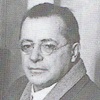

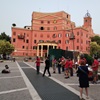

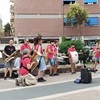
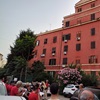
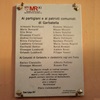 .
. 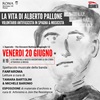
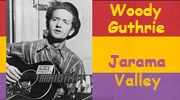
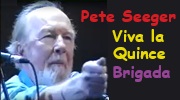
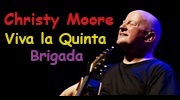
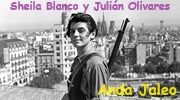
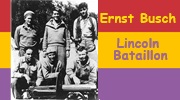
BIBLIOGRAPHY:
BONGIORNO Pino (2008) Una vita da comunista. Biografia di Antonino
Bongiorno. L'Albatros, Rome, Italy.
DEL CARRIA Renzo (2020) Proletari senza rivoluzione. Vol. 3. PGreco,
Rome, Italy. p. 88-89.
FAGGI Vico (1974) Sandro Pertini : sei condanne due evasioni.
Arnoldo Mondadori Editore, Milan, Italy. p. 334.
FEDERICO Maurizio (1985) Il biennio rosso in Ciociaria, 1919-1920
: il movimento operaio e contadino dei circondari di Frosinone
e Sora tra dopoguerra e fascismo. E.D.A., Frosinone, Italy.
GIAMMARIA Gioacchino (1976) Dati sulla Resistenza in Ciociaria.
Quaderni della Resistenza Laziale, Regione Lazio, n. 8,
Roma, Italy.
GIAMMARIA Gioacchino, GULIA Luigi, IADECOLA Costantino (editors)
(1985) Guerra, liberazione, dopoguerra in Ciociaria: 1943-45.
Amministrazione provinciale Frosinone, La Tipografica, Frosinone,
Italy
HOBSBAWM Eric John (2007) Gente non comune. BUR , Milan, Italy.
p. 229-230.
MAZZOCCHI Ermisio (2003) Lotte politiche e sociali nel Lazio meridionale:
storia della Federazione del PCI di Frosinone, 1921-1963. Carocci,
Rome, Italy.
SALVATORI Roberto (2013) Guerra e resistenza a sud di Roma: Monti
Prenestini e Alta Valle del Sacco 8 settembre 1943-5 giugno 1944.
Pubbliesse, Olevano Romano, Rome, Italy.
WEBSITES
VISITED:
The Abraham Lincoln Brigade Archives. Item "Alberto Pallone".
link.
Centro per la Riforma dello Stato (2025) Un bombardino per la
libertà: Alberto Pallone link
Marzia Coronati (2023) Compagno Bombardino. Produzione: Sveja
Podcast link
Camp d'internement Saint-Cyprien link
 page
created: August
8th, 2024 and last updated: June 18th, 2025
page
created: August
8th, 2024 and last updated: June 18th, 2025